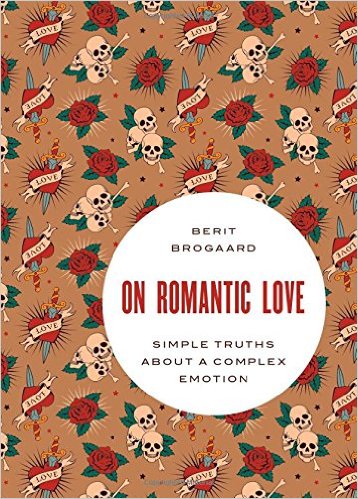 Berit Brogaard, Department of Philosophy, University of Miami
Berit Brogaard, Department of Philosophy, University of Miami
January 2016 – Popular movies like The Notebook portray heroic old people who continue to love their spouses, in spite of enormous hardship. They love them ‘unconditionally’, in spite of the fact that an important part of the beloved’s brain has become beset with plaques and tangles, in spite of the fact that the beloved thinks the spouse is the pool guy, in spite of the fact that they are incessantly ransacking the fridge for something edible because they don’t remember that they just ate a three-course dinner.
But we don’t need movies to teach us about unconditional love. We learned it at the first wedding ceremony we attended as little munchkins. “I, Rose, take you, Tiger, for my lawful husband, to have and to hold, from this day forward, for better, for worse, for richer, for poorer, in sickness and in health, until death do us part.” This is the love we cherish, indelible love, the love that outlasts permanent changes in personality and bodily function.
Many philosophers view love in this way. One of the most commonly held views in the philosophy of love has it that affection toward another person based on contingent features of the other could not possibly amount to ‘true’ or ‘real love’ (Nozick, 1974; Kraut, 1986; Kolodny, 2003; Grau, 2010). Call this the ‘transcendent view of love’. Contingent features are features that a person could lose without thereby failing to be the same person, for example, hair color, sense of fashion or wealth.
Contingent features contrast with a person’s essential features, that is, features (or a set of features) that a person could not lose without becoming a different person. Which features of persons are essential has been a matter of great controversy, and it is not one we need to resolve here, as we can limit the discussion to features that people on all sides of the debates would regard as contingent, such as superficial physical features.
It is sometimes said that only love that is love of the whole person can be ‘true love’. But love inevitably is love of the whole person (Brogaard, 2015). Compare love to fear. Your fear of a Huntsman spider may be based on its hairiness and size. Yet you fear the spider, not simply its hairiness and size. Similarly, your love of your beloved can be based on her chartreuse hair, sensuous eyes or wacky humor. Yet the object of your love is the person, not her features. Yet love can still be based on features.
Two main arguments have been offered in favor of the transcendent view of love, i.e., the view that affection toward another person based on contingent features of the other could not possibly amount to real love. In previous work I have argued that both arguments fail (Brogaard, 2015; Brogaard, in press). One runs as follows (Nozick, 1974):
- Only affection that is unconditional can amount to real love.
- Affection based on contingent features of a person, however, is conditional.
- So, affection based on contingent features of the beloved is not true love.
The first premise, i.e., that only affection that is unconditional can amount to real love, however, is problematic. On the most sensible way of understanding ‘unconditional love’, love is unconditional only if there are no conditions under which it will fade (as long as you still exist). But on this understanding of ‘unconditional love’, it is highly questionable that only unconditional love can amount to true love (I shall here set aside the complicated and controversial case of love for people who don’t exist for now).
First, if the beloved were to begin to act in cruel ways toward you, and your affection towards him were to fade, this would hardly be an indicator of whether your affection towards him in the past was really a state of true love. But surely how a person behaves in the future cannot be a guide to the nature of your love for that person now.
Second, besides being plainly counterintuitive, the view that love must be unconditional is at odds with three dominant alternative philosophical theories of love:
- Love is a union as opposed to, say, a feeling of a union. Aristotle, for example, held this view. He is quoted as saying that ‘love is composed of a single soul inhabiting two bodies’. (Diogenes Laërtius, Third Century AD).((The Greek word ‘philia’ is sometimes translated as ‘friendship’ rather than the more pertinent ‘(mental) love’))
- Love is historical, i.e., it involves a belief concerning a relationship (Nozick, 1974; Kraut, 1986; Kolodny, 2003; Grau, 2010). More specifically, love requires a belief to the effect that you are in some sort of relationship with the other person. Niko Kolodny, for example, argues that ‘love … partly consists in the belief that some relationship renders it appropriate’ (2003, p. 146). That is, according to Kolodny, you do not truly love a person until you believe that you have a relationship with that person that makes it okay to love him or her.
- Love is a complex emotion (as opposed to a basic emotion), much like grief or jealousy (Rorty (1986/1993), Brown, 1987; Hamlyn, 1989; Baier, 1991; LaFollette 1996; Frankfurt 1999; Badhwar, 2003; Helm, 2009; Brogaard, 2015; Brogaard, in press). Contemporary emotion views hold that emotions, unlike moods, are not a free-floating feeling but feelings or other kinds of attitudes directed at things or events. In this respect contemporary emotions views differ from classic emotion views, such as that defended by William James (1884). According to James, emotions are simply feelings or perceptions of bodily changes. On contemporary emotion views, love is some sort of feeling or emotional attitude towards the beloved, for instance, a deep concern (LaFollette 1996; Frankfurt 1999).
On all three views, love is by definition based on contingent features of the beloved in the sense of being constituted by such features. The feature of being part of a union is a contingent one (union view). So is the feature of being the object of a belief concerning a particular relationship (history view) and that of being the object of an affective state (emotion view). Consider for instance the role played by your contingent memories of the beloved. You cannot have a union with another person that constitutes love without memories of the other person. So, were you to lose all such memories, your union would dissolve. Losing those memories would also mean the end of your beliefs about the other person. So, on the main views of love, love turns out to be conditional: there are conditions under which it will fade. Accordingly, if the first premise of the first argument were true, that would mean that no affection toward another person could count as true love. Hardly a satisfactory result.
It may be thought that ‘conditional’ should be assigned a different meaning than the one suggested above. It may be proposed that love is conditional just in case it persists only provided that certain events or changes that are specifiable ex ante do not happen. For example, you may be the kind of person whose romantic affection towards a partner will persist as long as your partner doesn’t cheat on you. This way of articulating the meaning of ‘conditional’, however, is just a variation of the one provided above. If your love fades following an incident of infidelity, then there is a condition under which your love will fade, which means that your love doesn’t transcend all contingent features of the beloved.
Let’s turn now to the second argument in favor of the transcendent view of love, which can be articulated as follows (Nozick, 1974; Kraut, 1986; Kolodny, 2003; Grau, 2010):
- If there were such a thing as (contingent) feature-based love, that would make our loved ones replaceable.
- Yet our loved ones are not replaceable.
- So, true love cannot be feature-based.
Here ‘replaceable’ should be understood as follows: if your beloved were replaced by a person with the same contingent features as the beloved, then this should make no difference to whether you love the person or not. Given this understanding of ‘replaceable’, the first premise of the second argument seems correct. If love is based solely on features that others can have, then it should not matter whether the beloved were replaced by a person with those same features.
The problematic premise is the second one (‘our loved ones are not replaceable’). The second premise is consistent only with the union view of love. On the union view, love is a union between two particular people. We can think of a union in the way we think of a set. A set is defined by its members. Sets with distinct members are themselves distinct. Likewise, unions composed of different individuals are distinct. So, on the union view, the beloved is by definition not replaceable.
The union view, however, is fraught with difficulties. Since the union view requires that there are two people standing in a loving relation, the view implies that love cannot be unreciprocated and that there cannot be love of a deceased lover or a hallucinated object. But it is hard to deny that the grief-stricken Anna loves Dr. Malcolm Crowe in the movie The Sixth Sense, despite the fact that Malcolm is dead.
This leaves us with the history view and the emotion view. Both are committed to the replaceability of our loved ones. On the history view, you love another person only if you believe that a particular love relationship exists between you and your beloved. As this sort of belief could persist even if your beloved were replaced by a doppelganger, the history view does not imply irreplaceability. Of course, one could hold a view to the effect that love requires not just a belief about a relationship with a particular person but an actual relationship with another person. This, however, would be a version of the union view, not the history view (as currently defended in the literature).
Turning to the emotion view, it is not empirically plausible that our affection for others are emotional responses to essential features no one else could possess (also known as a person’s ‘individual essence’) (Brogaard, 2015). Take the view that a person’s individual essence is the zygote from which we derived (Kripke, 1980). It is rather implausible that your affection is a response to a zygote. Or take the view that a person’s individual essence is a haecceity, a view that was popular among medieval scholars.
A haecceity is an abstract thisness of a person that sets the person apart from other people and that therefore is unrelated to qualities that the person may share in common with other people. It is equally implausible that affection could be a response to an abstract thisness that is not perceivable through the senses. So, on the emotion view, love is a perceived/felt response to either contingent features of the beloved or essential features that others could also possess (e.g., features essential to being a certain type of person, also known as a person’s ‘quiddity’).
But if our emotional responses are based on features others could also possess, this means that we could have the same emotional responses to a replica of our beloved as we do to our beloved. Now, this does not mean that your feelings could not change if you were to learn that your loved one had been replaced by a perfect replica. Over time, your affectionate response toward your beloved may come to be in part a response to your memories of the history you have had together. This would in many cases suffice for explaining why you wouldn’t love the replica (who after all has all the same contingent features as your beloved). But even if love can come to be partially a response to such memories, it could also easily be the case that your love would persist, even if your beloved were replaced by a doppelganger. After all, you might not know about the swap.
In previous work, I have defended a particular version of the emotion view (Brogaard, 2015, in press). On my view, love is a particular (positive or negative) perceived bodily or mental affective response to contingent features of the beloved. This response ordinarily involves a change in physiology (initially, it might involve a change in energy levels, feelings of pleasure and emotional stability) and a percept that the change is caused by a particular person. As in the case of grief and jealousy, the bodily and mental responses people have when they are ‘in love’ will vary from individual to individual and across time and culture. They will also vary depending on the type of love we are talking about.
Parental love typically feels differently from romantic love, which in turn feels differently from friendship love and attachment love. The valence of love, i.e. whether the bodily or mental responses are represented as good or bad, can vary widely too. Unrequited love can be emotionally, and perhaps even physically, painful. Falling in love, on the other hand, can feel like a state of ecstasy. In fact, love can arise from an underlying brain chemistry that resembles that triggered by cocaine use.
Helen Fisher (2005) conducted a series of fascinating brain imaging studies of the brain chemistry and brain structure underlying new love. She found that serotonin, dopamine and norepinephrine are crucially involved in the initial stages of romantic love in much the same way as they are in cocaine use. When you fall in love with someone, norepinephrine fills you with raucous energy, serotonin boosts your self-confidence and dopamine generates a feeling of pleasure.
If love is a perceived response to a particular rendition of the beloved, as I propose, we can account for unrequired love, love of dead people, love that isn’t felt (for instance when the responses are processed below the level of conscious awareness) and inappropriate (or irrational) love (see Brogaard, 2015). I will focus on the rationality of love to exemplify the potential payoffs of my theory. For romantic love to be rational, there must be a good fit between the beloved’s qualities and the loving feeling (Goldie, 2010; Brogaard, 2015), and you must accurately perceive the qualities of the beloved that form the causal basis for the love in question. Many different sets of qualities can guarantee this type of proper fit. The set of qualities that I have and the set of qualities that you have may very well make both of us a good fit for the very same partner.
While all qualities of a person are important for determining whether there is a proper fit between the loving feeling and the object of that love, not all qualities are relevant to whether your love misrepresents the beloved in a way that makes it irrational. If you are red/green colorblind, you have difficulties distinguishing red and green. Red and green things look “grayish” to you. So, you may well misperceive your beloved (e.g., her skin color), but your love can still be perfectly rational, despite your color illusion. If, on the other hand, you are in love with a fantastical creation of your beloved instead of your beloved as she really is, your love is irrational.
Consider the 2001 romantic comedy Shallow Hall, directed by Peter Farrelly and Robert Farrelly. In the movie Rosemary (played by Gwyneth Paltrow) is morbidly obese, but fat-ist Hal (played by Jack Black) sees her as skinny and falls in love with her. Because Rosemary’s being skinny fuels Hal’s affection for her, his illusory perception of her therefore contributes to the irrationality of his love for her. So, to emphasize, the idea here is not that there are properties that ought to be irrelevant for love under all circumstances. Which properties are relevant for love will depend on what fuels the affection.
If you have a white supremacist with a peculiar color perception abnormality that makes you misperceive a black person as white, and the person’s perceived whiteness is fuelling your love, then your love would be illusory and hence irrational. This, of course, raises some interesting ethical issues insofar as your love of a white person (perceived correctly) might be rational in the envisaged circumstances. But here we have to keep in mind that saying that love is rational does not imply that the affection ought to happen for the reasons it does, all things considered.
It has often been argued that love cannot be meaningfully said to be rational or irrational (Thomas, 1991; Velleman, 1999; Smuts, in press). Lawrence Thomas, for example, argues that, ‘there are no rational considerations whereby anyone can lay claim to another’s love’ (1991: 474). I agree with Thomas that you are under no obligation to continue to love someone you don’t love, even if there is no good reason not to love them. But the view proposed here does not have this latter implication. Love that already obtains is rational if (i) there is a proper fit between the loving response and the beloved and (ii) the love isn’t illusory in the relevant respects. If your love for your beloved is irrational, you ought to discontinue the love, make an effort to fall out of love and eschew things that might deepen the love.
These two constraints on rational love, however, don’t tell us anything about when it is irrational not to love someone we don’t love. They only tell us when it is irrational to love someone we already love. Good reasons for loving your beloved only renders it permissible for you to love her, it does not require that you begin or continue to love her. This is because there never are enough reasons that you ought to love someone, but that there sometimes are enough reasons that you ought not to love or stop loving.
Love is irrational, and hence impermissible, if (i) there is not a proper fit between the loving response and the beloved or (ii) the love is illusory in the relevant respects. But when there is a proper fit and no misrepresentation, then continuing the love is optional, just like it’s optional whether or not you want to perform actions that are not wrong. It’s optional whether or not you want to raise your hand right now. It’s perfectly fine for you to do it. It’s a permissible act. Punching someone, on the other hand, is irrational and morally prohibited. Likewise, it’s perfectly rational to cease to love a wonderful person but irrational to continue to love someone who isn’t worthy of your love.
References
Badhwar, N. K., (2003). “Love”, in H. LaFollette (ed.), Practical Ethics, Oxford: Oxford University Press, 42–69.
Baier, A. C. (1991). “Unsafe Loves”, in Solomon, R. C. & Higgins, K. M. (eds.), 1991, The Philosophy of (Erotic) Love, Kansas University Press, 433–50.
Brown, R. (1987) Analyzing Love, Cambridge: Cambridge University Press.
Brogaard, B. (2015). On Romantic Love: Simple Truths about a Complex Emotion, New York: Oxford University Press.
Brogaard, B. (in press). “Romantic Love for a Reason,” Oxford Handbook of Philosophy of Love, Christopher Grau & Aaron Smuts, eds.
Ekman, P. (1999). “Basic emotions”. In T. Dalgleish and T. Power (Eds.) The handbook of cognition and emotion. Pp. 45-60. New York.: John Wiley & Sons.
Fisher, H. (2005). Why We Love: The Nature and Chemistry of Romantic Love, New York: Henry Holt and Company.
Frankfurt, H., (1999). “Autonomy, Necessity, and Love”, in Necessity, Volition, and Love, Cambridge: Cambridge University Press, 129–41.
Hamlyn, D. W. (1989). “The Phenomena of Love and Hate”, in Soble, A. (ed.), 1989, Eros, Agape, and Philia: Readings in the Philosophy of Love, New York, NY: Paragon House., 218–234.
Helm, B. W. (2009). “Love, Identification, and the Emotions”, American Philosophical Quarterly, 46: 39–59.
Goldie, P. (2010). “Love for a Reason”, Emotion Review 2, 61–67.
Grau, C. (2010). “Love and History,” Southern Journal of Philosophy 48 (3):246-271.
James, W. (1884). “What is an Emotion”. Mind 9: 188–205.
Kolodny, N. (2003). “Love as Valuing a Relationship”, Philosophical Review 112: 135–89.
Kraut, R. (1986). “Love De Re.” In Midwest Studies in Philosophy, vol. 10, ed. P. A. French, T. E. Uehling, and H. K. Wettstein, 413–30. Minneapolis: University of Minnesota Press.
Kripke, S. (1980). Naming and Necessity, Cambridge, MA: Harvard University Press.
LaFollette, H. (1996). Personal Relationships: Love, Identity, and Morality, Cambridge, MA: Blackwell Press.
Nozick, R. (1974). Anarchy, state, and utopia, New York: Basic Books.
Rorty, AO. (1986/1993). “The Historicity of Psychological Attitudes: Love is Not Love Which Alters Not When It Alteration Finds”, in Badhwar, N. K. (ed.), 1993, Friendship: A Philosophical Reader, Ithaca, NY: Cornell University Press, 73–88.
Smuts, A. (in press). “In Defense of the No-Reasons View of Love,” Oxford Handbook of Philosophy of Love, Christopher Grau & Aaron Smuts, eds.
Velleman, J. D. (1999). “Love as a Moral Emotion”, Ethics 109: 338-374.




